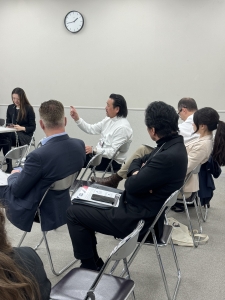SSGA promotes US Identity Preserved crops at FOODEX Japan
After the FOODEX Japan event, it’s safe to say that Specialty Soya and Grains Alliance (SSGA) director’s and staff’s dogs were barking.
March 5-8, SSGA exhibited at FOODEX Japan, which is the largest annual food and beverage trade show in Asia, offering exhibitors access to Japan’s $788 billion food market. A unique feature of the show, FOODEX brings together food and beverage companies from more than 60 countries and regions, placing exhibiting companies in pavilions specific to their home country – giving attendees the opportunity to walk all the way from Thailand to Korea to Brazil. Hence, SSGA’s tired feet.
“The amount of traffic and interested people coming across the expo floor has been impressive,” said Bryan Stobaugh, director of licensing and commercialization at Missouri Soybeans and an SSGA board member. “Some of them stopped by the booth because they didn’t exactly understand what we do, and others stopped by to talk because they knew what we do.”
Japan is the fourth-largest global market for U.S. exports of consumer-oriented food products, making it an ideal audience for SSGA’s vision to promote and enhance value throughout the supply chain, from farmer to food business. This year, FOODEX attracted over 76,000 visitors across the four-day convention and trade show.
“Japan is a great example of why specialty soy and grains works from the United States,” Stobaugh said. “They are a country that demands high quality, effective and nutrient driven products to go into their bodies. So, our soy and specific grains really fit their bill because they can go down so many avenues with the importation of specialty soy.”
In conjunction with FOODEX, SSGA hosted a U.S. Identity Preserved International Summit Workshop on Thursday, March 7, which was sponsored by the Minnesota Soybean Research & Promotion, North Dakota Soybean Council, Missouri Soybean Merchandising Council and Wisconsin Soybean Marketing Board.
“Hosting the U.S. Identity Preserved International Summit Workshop was an opportunity for us to connect on a deeper level with Japanese purchasers and brokers who are interested in premium U.S. field crops,” said Shane Frederick, SSGA’s manager of strategic programs. “The more we tell the U.S. Identity Preserved story – explaining the protocols and labeling behind the logo – the more traction we gain and can continue growing the brand.”

The workshop featured a robust agenda, including remarks from Craig Elliott with USDA Foreign Agriculture Service and Kelly Kim from Food Export Midwest/Northeast, presentations from Frederick and Stobaugh, along with video recordings from SSGA Board Chair Bob Sinner and SSGA Board Member Rob Prather. U.S. farmers also provided a crop outlook via video recordings.
“There were a lot of things that I learned for the first time at the workshop,” said one workshop attendee. “One of our clients is interested in using non-GMO soybeans in the future, so we are collecting information about that, and this workshop was a great opportunity for that.”
Because the target audience for the workshop was broad, presentations included information about suppliers of identity preserved, variety-specific field crops; an explanation of the U.S. Identity Preserved system and assurance plan and how it assures quality and traceability; opportunities to include the Identity Preserved United States label on retail product packaging and how to communicate the mark’s message to customers; and crop updates and outlooks from U.S. farmers.
“The audience in that room is so dynamic,” Stobaugh said. “We are able to go into these workshops at a level where we can talk and it’s communicable and workable, not just data, data, data. Sometimes, we just need to talk.”
By the end of the week, the SSGA delegation had not only connected with Japanese companies, but companies from across the world. And they even taught a native Japanese speaker a little bit of English slang – “My dogs are barking.”
“Overall, we saw really good numbers while at FOODEX,” Stobaugh said. “With the help of our contractors, we had really good oversight in how we manage taking the potential leads that visited the booth and putting them in a database so that we have a form of record moving forward. It was a great experience.”





